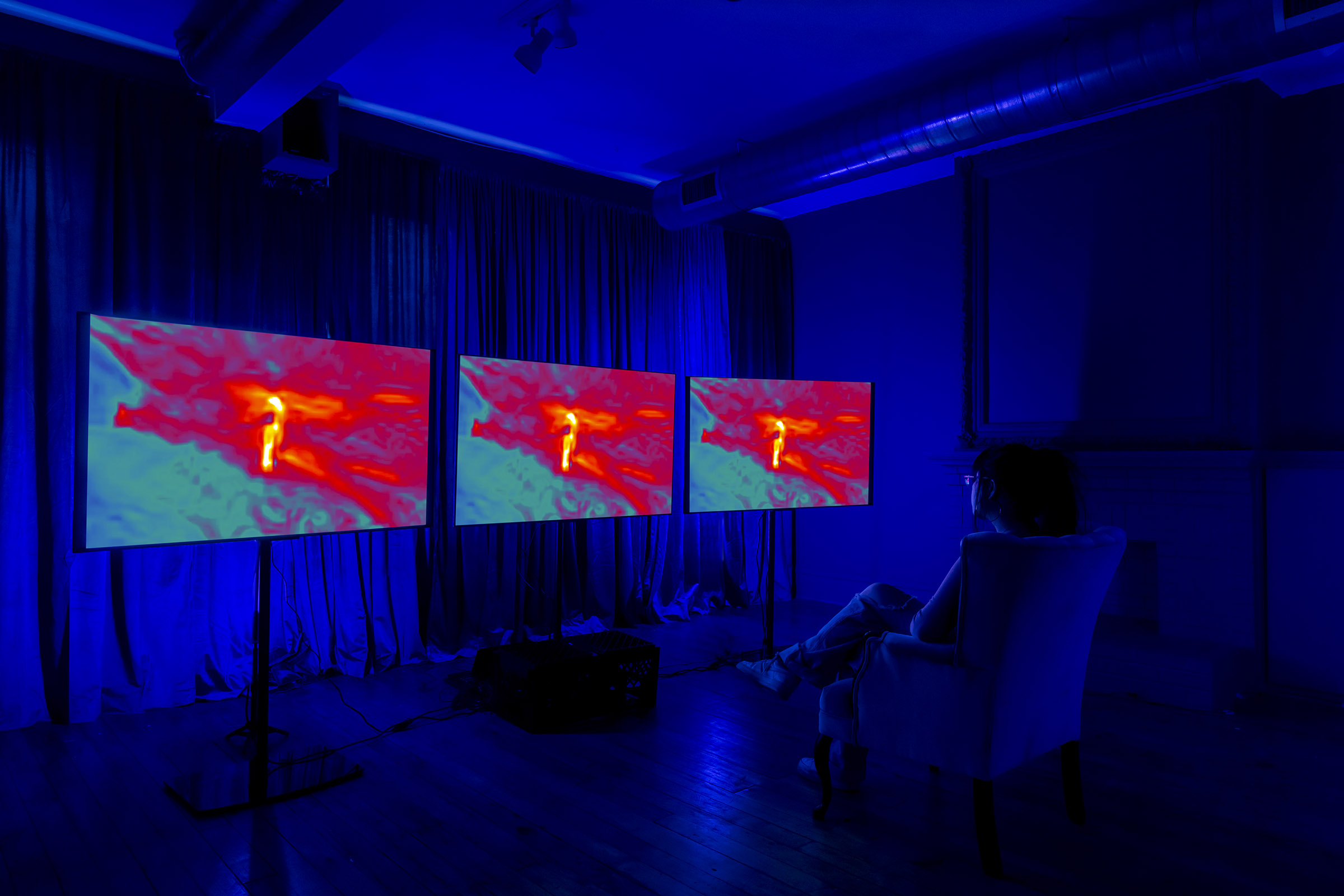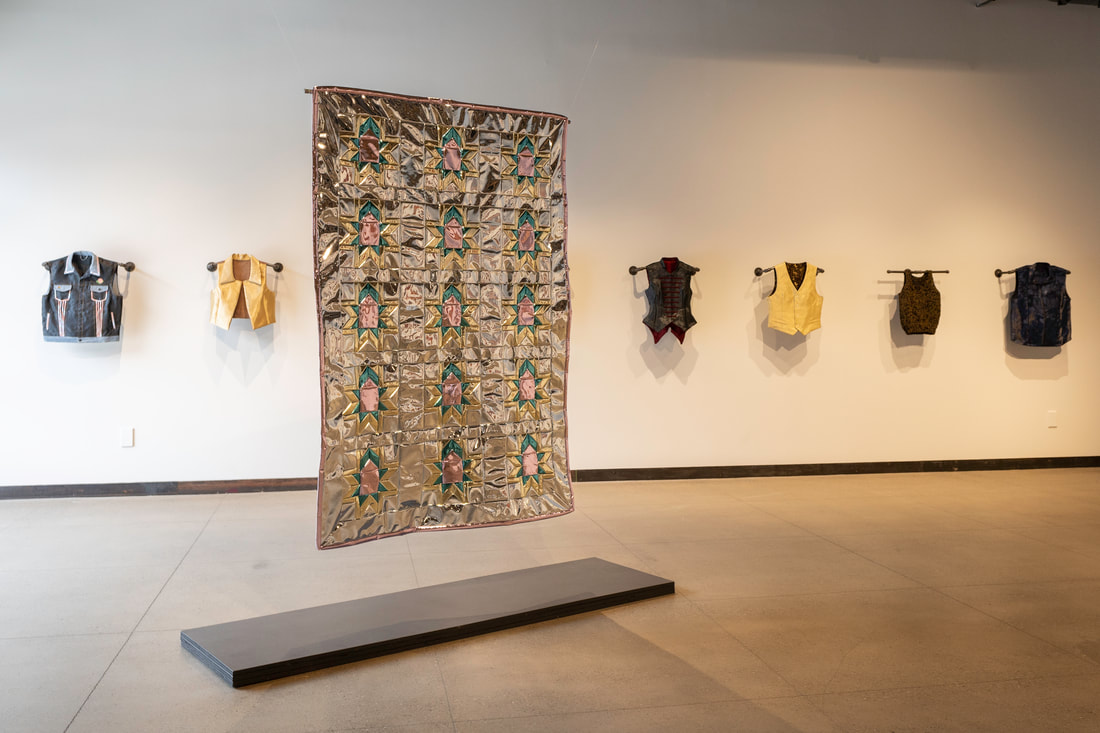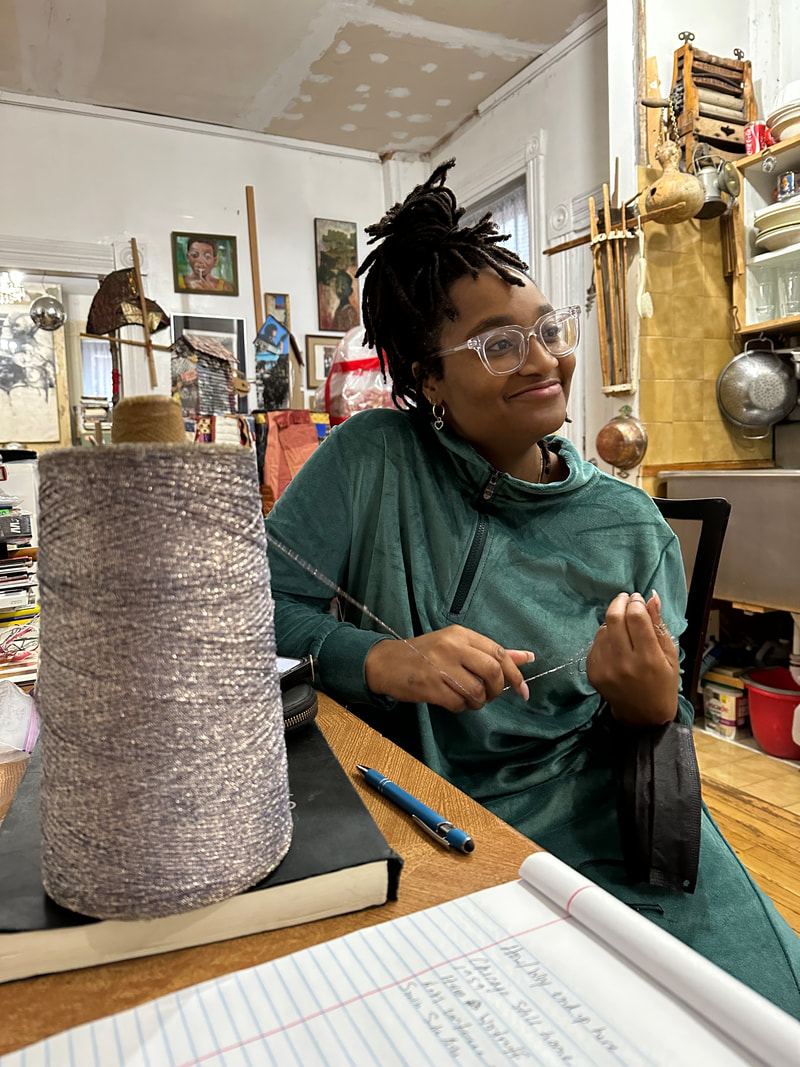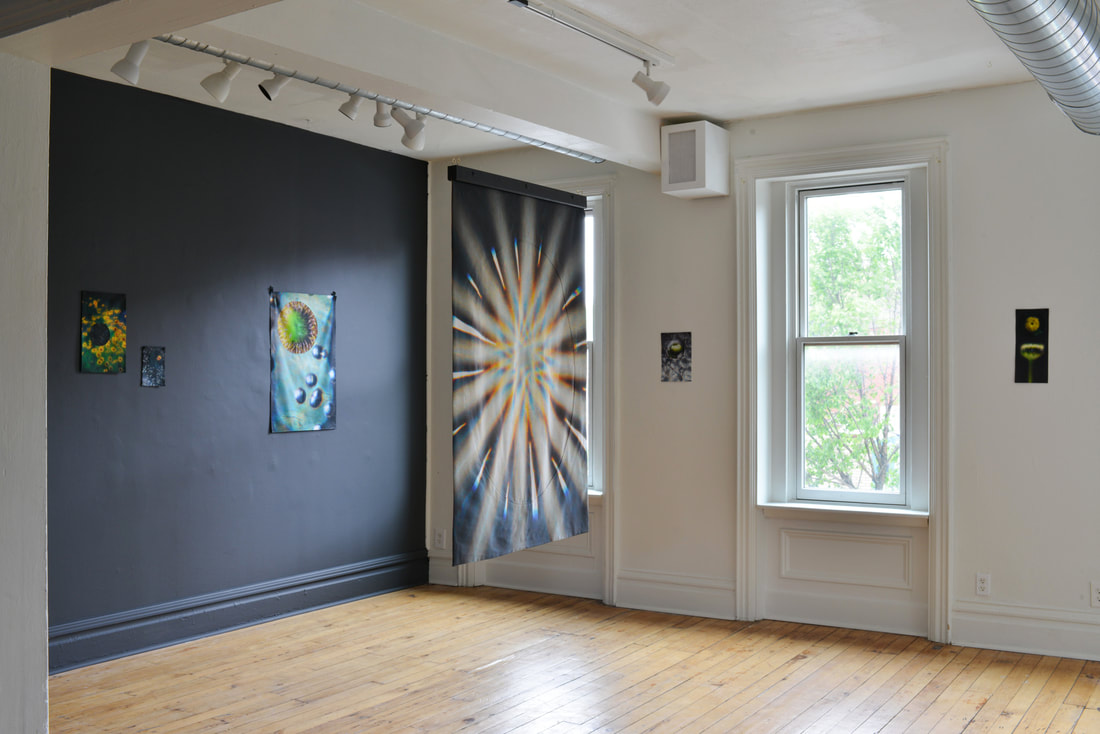Finding Alice, a conversation with C. Ryu and Lena Hansen
C. Ryu, Alice and Alice: in Freefall (2023-2024), Film Still, 18:22, all imagery was produced by FLIR thermal technology
When I saw C. Ryu’s Alice and Alice: in Freefall, I was taken to a place of uncertainty and fear. Lines between fact and fiction blurred and I was left feeling a sense of danger and mistrust towards the characters in Ryu’s video work.
Drawing from the life of Alice Hyun, the first recorded Korean American, Ryu activates Hyun’s contentious legacy as a double agent. Thought to have been a spy for both the United States and North Korea, the archival documentation which exists about Hyun’s life provides evidence for and against this theory.
Using snippets from the legal testimony of Alice Hyun’s brothers, Peter and David, along with metaphors and characters from Lewis Carroll’s Alice in Wonderland, Ryu takes the viewer through an emotional journey. As the audience, we question the character’s version of events and we leave questioning our own.
It was a pleasure to speak with Ryu about her work. We delve into the complicated ethics surrounding historical narratives, being a “bad” archivist, and the futile quest for a neat, unwavering historical account.
C. Ryu, Alice and Alice: in Freefall (2023-2024), Film Still, 18:22, all imagery was produced by FLIR thermal technology
Lena: Let’s start with how you came to create Alice and Alice: in Freefall.
C. Ryu: Alice and Alice: in Freefall is a video piece that I wanted to make around this figure, the first recorded Korean American born in Hawaii and also the first Korean American that obtained American citizenship through birth in 19 03. I had been hired as a research assistant to translate a biography on Alice Hyun by Jung Byung Joon from Korean to English. (1) Other than this biography, her father has his public archives at USC where there is material about Alice, in English. But, there’s not much else available in English to contextualize who Alice is. I was very attracted to this figure because there was still so much research to be done around her and she didn’t fit into one box. In some ways, this piece is about this figure, Alice Hyun, but in other ways, it’s nothing about her at all. Maybe it’s more about the politics around this figure.
L: I’m interested in how you use Alice Hyun as a historical figure but also a vessel to explore the politics of nationality. Given the minimal amount of documentation that exists about Alice you’ve had to piece together elements of Alice using other people’s words. What was it like to represent such an elusive figure?
C: That was actually very purposeful on my part. I’m interested in the distrustful narrator or a narrator that’s tricking the viewer. I think all narration is subjective and we can never really get away from our own desires. I wanted to subtly hint that I understand this piece also reveals my desires, that this is not an objective, historical view of Alice Hyun.
I’m really interested in the distrustful narrator also because I see myself as a “bad” archivist. I’m interested in some things but there are other things in the archives that I do not know how to place or do not understand how to grapple with. Although I am doing a lot of research around this era, I am not somebody who has all the answers about Alice nor am I somebody who’s capable of answering those questions.
I don’t think I am necessarily trying to represent her, rather I’m trying to represent the complexity of all of the different views of her. Me playing this character in the video that people are perceiving as Alice and thinking too about how in nationalism, blood and body are so tied together. There are a lot of these narratives in the diaspora about longing for a home. I’ve grown up with a lot of that sentiment in myself and in seeing others around me longing for something. It feels like misplaced nationalist propaganda.
Part of being critical about this intense nationalism in people who are away from a land is questioning where this is coming from. In the same way, Alice can be seen as a liberation fighter. She was also in the U. S. military as a linguist; which is quite funny, because she was in the U.S. military during the Pacific War, so that means that she could only join the U. S. military because she was a U. S. citizen. But in actuality, this was because she had anti-Japanese sentiment, so can we really view her as pro American? I’m not quite sure. Her placement in nationality or where her alignments are, that’s not a question I think I can ever answer.
C. Ryu, Alice and Alice: in Freefall (2023-2024), Film Still, 18:22, all imagery was produced by FLIR thermal technology
L: You use the term “bad” archivist but I want to push back on that a little because I don’t see your approach as “bad” or lacking in some way. We often think that the existence of documentation or an archive equals the existence of an answer.
I’m drawn to the way you use archival material in this context, it’s not about solving a mystery or arriving at an answer. You’re not saying this one historical narrative is the definitive one but instead you’re exploring the in betweens and the changing nature, not only of a person’s life and their political affiliations, but also the way larger global politics also shift over time.
Your use of court deposition transcripts is a great example of this. In your piece, you pull from the legal depositions of Alice’s brothers. We see them being questioned about Alice’s possible communist alliance. You take these documents and draw out the tension and anxiety faced by the Hyun family. What drew you to these documents and what were you trying to tease out of them?
C. Ryu, In Free Fall (2024), Inkjet Prints, 11” x 8.5,” Digital Overlay of Thermal Imagery of Ryu’s body on top of “Communist Political Subversion Part 1 and Part 2…”
C: I think the main document that stood out to me was the Congress trial document. You know, this was in the McCarthy era of the United States, where communism was used to create fear around certain bodies and nationalities. There were a lot of real life consequences that came from it. Looking at those documents now they still hold a resonance of this fear of the immigrant body and the anti-immigration clauses that exist in the world.
Going through those documents looking for Alice I realized the questions, rather than the answers, were the most interesting part. The different lawyers who are really pressing on the Hyun brothers for an answer that they clearly want, and you can tell because it’s repetitive, almost like a spell that someone is repeating over and over again, until they get what they want.
It’s very clear they’re approaching these brothers as the enemy, as if “if you don’t say this that means you’re an enemy of the state.” It’s through these questions rather than the Hyuns’s answers that I’m able to see the state politics during this time. What was most important to the state was condemnation, to say “you were communist and your whole family is communist.”
C. Ryu, Alice and Alice: in Freefall (2023-2024), Film Still, 18:22, all imagery was produced by FLIR thermal technology
L: Text and translation feature heavily in your work, so I was really fascinated by the fact that Alice and Peter were translators with the U.S. military. It seems like your interests in language, war, and nationalism come together in Alice’s story.
C: It’s so funny to me that what you’re asking me is basically getting at the core of where this whole piece culminated; in reading this text and feeling like it was a pressure cooker. I think the most important part of this piece is how difficult all of this text is, even if we only see it in short moments.
C. Ryu, In Free Fall (2024), Inkjet Prints, 11” x 8.5,” Digital Overlay of Thermal Imagery of Ryu’s body on top of “Communist Political Subversion Part 1 and Part 2…”2
I’ve picked specific moments from the court documents to make this eerie and haunting and very much so people are sitting in discomfort. I’m emulating the fact that all of this text is not easy. I’m very much in collaboration with Alice in her aliveness, in her documents, and probably all of her family in that way.
Everything about this piece is me really holding back to amplify, to emulate the fact that there is danger and something at stake. Even though this happened so many years ago it has resonance and I actually didn’t have to do much to amplify. So yes I’m clipping and editing, but the text does the work on its own.
C. Ryu, In Free Fall (2024), Inkjet Prints, 11” x 8.5,” Digital Overlay of Thermal Imagery of Ryu’s body on top of “Communist Political Subversion Part 1 and Part 2…”2
L: I think you were extremely successful in bringing out that anxious, uneasy, pressure cooker feeling. Did you feel a sense of responsibility as a witness to these documents?
C: When I came to this research there was no responsibility. I was hired as a researcher and translator. I just got to enjoy this research. I would go to the microfilm labs at the New York Public Library, look up the Korean American newspaper that the Hyun family also worked for. There were all different ways we were tracking her but I didn’t feel much pressure. I think there is a lot of levity in ways around this figure because I have seen her through other scholars’ eyes who have done the heavy lifting before me and I think that’s also why when I came into this I was able to see all the empty spaces, rather than needing to figure all this out.
So, maybe that’s my way of using this story to talk about my own politics or desires, rather than it being a retelling of Alice’s life. There are others who’ve already done that.
C. Ryu, Alice and Alice: in Freefall (2023-2024), 18:22, Installation documentation: 3 channel video on 55” monitors in fabricated blue room, Photo Credit: Tom Little
L: It’s really special that while this piece activates Alice’s story and legacy, the goal
isn’t to come to clear conclusions about who she was. I think just in exploring these tensions, you’re preserving her history and bringing it to life. As you mentioned earlier, Alice’s story brings up a lot of questions around war and nationalism that still remain resonant. I wanted to know what your thought process and philosophy was when approaching subject matter that is still very pertinent. I was also thinking about how there are parts of Alice that you draw on that are not in the archives; her absence in these places could have been very intentional, a form of self preservation.
C: That’s the complexity of any type of history telling, right? Whether it be the archives, the news, photojournalism, oral history, there is such a complicated web of ethics and morality that is involved in this but that doesn’t mean it’s not necessary.
That’s exactly why it’s so complicated, because all the people who are part of the storytelling in ways are “exploitable.” Maybe that’s too harsh of a word, and this is definitely my opinion. In ways, that is also because I have grown up in Western media that is based in colonialism. I do not trust the media. I do not trust in history telling or storytelling. But there are moments in the present that need to be documented. When we think of protest culture or war or genocide, there are things that have to be documented but again, for whose benefit, who is running this media, what is being allowed to be shown. It’s all very, very complicated. I think that’s why these mediums are necessary, but it’s always up to us to ask questions about why we’re seeing things, or who is telling this story, and why we are consuming this story.
It’s a complicated balance. I’m very critical about all the things that I’m doing, but maybe that’s why I’m doing them is because I want to understand, right? I think to understand the present politics you do have to look to the past to see the cycles of things. Maybe that’s why I’m drawn to how hot these topics are because at the end of the day, just because things are complicated and things are difficult to talk about doesn’t mean they shouldn’t be contextualized.
L: That’s what’s so beautiful about the entire piece is that it acknowledges that even if the historical record is not perfect, we have control in terms of how we activate these stories and bring them to life. I just appreciate that you did this without trying to create this clear, concise, perfectly thought out narrative. The exploration itself is honoring the complicated contentious history.
C. Ryu, In Free Fall (2024), Inkjet Prints, 11” x 8.5,” Digital Overlay of Thermal Imagery of Ryu’s body on top of “Communist Political Subversion Part 1 and Part 2…”2
C: That was the thing that kept coming up when I was getting feedback. One of the things that kept annoying me was almost everybody asked me, so was she a North Korean spy? That was the thing that everybody wanted to know at the end of the day, was she an actual spy? Was it the U.S. or was it North Korea? And that frustrated me to no end because there’s not gonna be some magical piece of evidence that shows up after all these years to confirm or deny this. Why does she have to be one or the other? It helped me be a lot more careful in placing Alice’s stories. There are documents that hint at conflicting things but, how are we ever gonna know?
L: In my work as an archivist, there’s often the assumption that the archive is going to be this treasure trove of answers, and it isn’t. But I think that’s what makes them great, you’re not just going to go in and find exactly what you’re looking for. You find things that complicate the story and expand the picture.
C: Yeah, this person is human, not a character in a spy movie, even though everybody wants to see her that way. You know? Humans are not clean, we have fluctuating political motives and lifestyles, interests, but that’s difficult for people to realize outside of themselves.
L: It’s also difficult for an archive to capture that because there is definitely an impulse within archival work to make sense of something, to categorize things, to literally put them into neat boxes.
C: That’s why I think I wanted it to be part fantasy, I have this storyline of Alice that I’m creating in my head that I am also clocking as a scholar that this is not healthy. This is not Alice Hyun, this is not who she is. Obviously I have an emotional connection to this badass figure, but it’s not just about Alice Hyun’s life.
Footnotes:
- Jung, Byung Joon. Hyun Alice and Her Era: The tragedy of a border person swept up in history. Seoul: DolBaeGae Publications, 2015.
- Hearings before the Committee on Un-American Activities House of Representatives 84th Congress Second Session and Appendix to Hearings,” Jan 1, 1957.
Lena Hansen is an archivist and curator. Her work straddles museums, archives, and the arts, focusing on people and narratives which have been historically overlooked in mainstream institutions. She was the 2023/2024 Prospectus curatorial fellow at Brew House Arts and earned her MLIS from the University of Pittsburgh. Lena was born and raised in Kuala Lumpur, Malaysia. She lives in New York City.
C. Ryu is an interdisciplinary artist using translation as a tool to map forgotten histories – to reveal psychological shadows haunting | hunting the Korean diaspora – and performs contemporary translations of rituals for the living. Tracing the edges of the hidden and silenced perspectives of the past to inform the personal and political of the present, C. visualizes narratives utilizing multiple voices in tension with each other to highlight the complicated structures of empire and power while unraveling imperial illusions through geopolitical poetry. C. Ryu is a co-founder of Hwa Records and JADED (named 2022 People of the Year by the Pittsburgh City Paper). Ryu has performed, exhibited, and culturally produced at Carnegie Museum of Art; ICA, San Francisco; McDonough Museum of Art; LA Art Show; Kelly Strayhorn Theater; and more.



